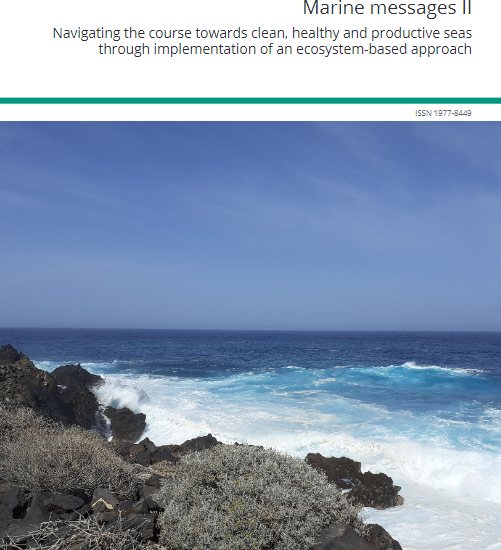EEA warns urgent action needed to bring Europe’s seas back to good condition
- June 30, 2020
- Posted by: Elaine Coles
- Category: Environmental, Water Issues, Europe

The European Environment Agency (EEA) is warning that urgent action is needed to bring Europe’s seas back to good condition and time is running out to reverse decades of neglect and misuse.
Europe’s marine ecosystems are facing increased threats posed by overexploitation of marine resources, pollution and climate change, according to a new report by the Agency.
The current condition of Europe’s seas is generally poor according to the EEA report ‘Marine Messages II’.
Historic and current use of our seas — from the Baltic to the Mediterranean — is taking its toll, resulting in changes in the composition of marine species and habitats to changes in the seas’ overall physical and chemical make-up.
Climate change is adding to these complex problems and worsening the impacts of the other threats. The combined effects of these changes are currently on a path which could cause irreversible damage to marine ecosystems, the EEA report says.
However, there are signs of marine ecosystem recovery in some areas as a result of significant, often decade-long, efforts to reduce certain impacts like those caused by contaminants, eutrophication and overfishing.
According to the EEA, EU Member States are unlikely to achieve in all their waters by 2020 the ‘good environmental status’ goal of the EU’s Marine Strategy Framework Directive (MSFD), the main EU law for marine environmental protection.
Nonetheless, significant progress and achievements have been made since the Directive is in place.
The conclusions are echoed by the European Commission’s own report, reviewing the current state of implementation of the Directive, which has been published alongside the EEA report. The EEA’s report feeds into the Commission’s review and suggests solutions that can help the EU achieve the legislation’s goal of clean, healthy and productive seas, mainly through ecosystem-based management.
All the data reported by EU Member States to the Commission is also being made public for the first time at a dedicated website on WISE-Marine, as well as data products and visualisation tools that provide an overview of the status of the marine environment in the EU.
Key findings in the report include:
- The EU’s maritime economy continues to grow and the competition for marine resources like fish, fossil fuels, minerals or renewable energy production and space is expected to increase. This will add extra pressure on already overexploited marine ecosystems. To avoid this, the growth in this sector needs to be decoupled from the degradation and depletion of marine ecosystem and be contained within the limits for their sustainable use.
- Despite EU and global commitments, biodiversity loss in Europe’s seas has not been halted. A high number of marine species and habitat assessments continue to show an ‘unfavourable conservation status.’
- Management measures targeting individual marine species and habitats have led to improvements in their condition in some EU marine regions, but this fragmented success does not offset the combined effects of multiple pressures from human activities across all of Europe’s seas.
- Where regional cooperation has been established and implemented consistently, negative trends in certain pressures are beginning to be reversed, for example, levels of nutrients and contaminants or the introduction of non‐indigenous species.
- Land-sea interactions, as well as the significance of coastal areas, are important dimensions to consider when actions are designed to reduce pressures on the marine environment.
- Changes in ocean temperature and oxygen content, and ocean acidification, indicate that negative systemic changes are taking place in EU marine regions, which further reduce marine ecosystems’ resilience including resilience to climate change.
- Past EU and regional policy implementation help identify a set of lessons for restoring marine ecosystems, which should be used when coming up with actions and solutions to achieve clean, healthy and productive seas.
- Achieving good condition for Europe’s seas is instrumental to the Sustainable Blue Economy and maritime spatial planning objectives as reflected in the European Green Deal.
Hans Bruyninckx, EEA Executive Director commented:
“Our seas and marine ecosystems are suffering as a result of years of severe over-exploitation and neglect. We may soon reach a point of no return, but, as our report confirms, we still have a chance to restore our marine ecosystems if we act decisively and coherently and strike a sustainable balance between the way we use of seas and our impact on the marine environment. In this context, the new EU Biodiversity Strategy to 2030 and other elements of the European Green Deal bring renewed hope that urgent and coherent action for protection and restoration will be underway.”
Click here to download the EEA report Marine Messages II in full
